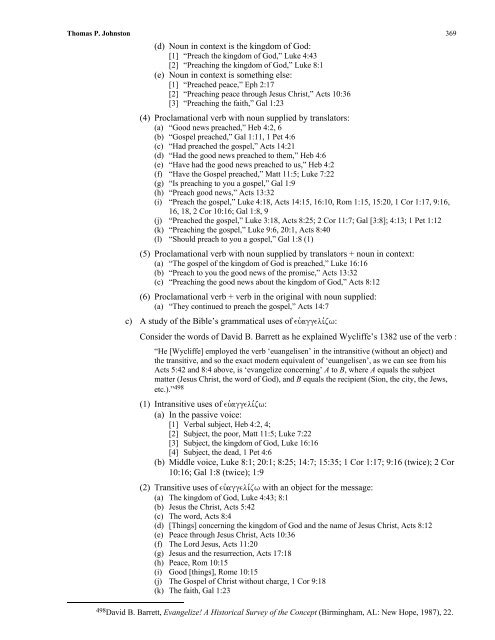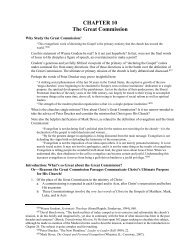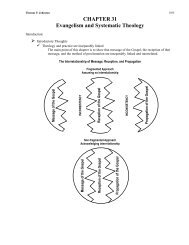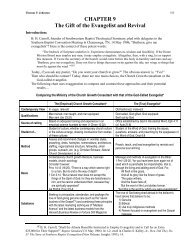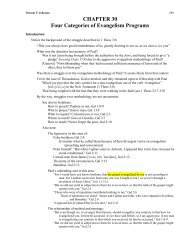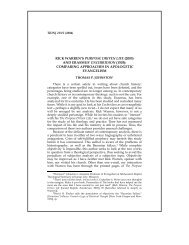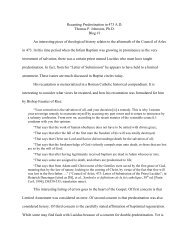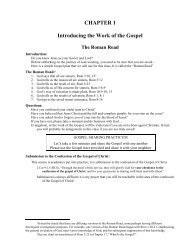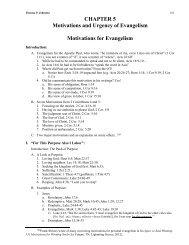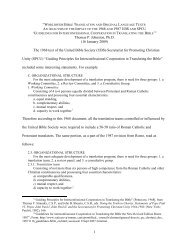CHAPTER 7 Defining Evangelizing - Evangelism Unlimited
CHAPTER 7 Defining Evangelizing - Evangelism Unlimited
CHAPTER 7 Defining Evangelizing - Evangelism Unlimited
You also want an ePaper? Increase the reach of your titles
YUMPU automatically turns print PDFs into web optimized ePapers that Google loves.
Thomas P. Johnston 369<br />
(d) Noun in context is the kingdom of God:<br />
[1] “Preach the kingdom of God,” Luke 4:43<br />
[2] “Preaching the kingdom of God,” Luke 8:1<br />
(e) Noun in context is something else:<br />
[1] “Preached peace,” Eph 2:17<br />
[2] “Preaching peace through Jesus Christ,” Acts 10:36<br />
[3] “Preaching the faith,” Gal 1:23<br />
(4) Proclamational verb with noun supplied by translators:<br />
(a) “Good news preached,” Heb 4:2, 6<br />
(b) “Gospel preached,” Gal 1:11, 1 Pet 4:6<br />
(c) “Had preached the gospel,” Acts 14:21<br />
(d) “Had the good news preached to them,” Heb 4:6<br />
(e) “Have had the good news preached to us,” Heb 4:2<br />
(f) “Have the Gospel preached,” Matt 11:5; Luke 7:22<br />
(g) “Is preaching to you a gospel,” Gal 1:9<br />
(h) “Preach good news,” Acts 13:32<br />
(i) “Preach the gospel,” Luke 4:18, Acts 14:15, 16:10, Rom 1:15, 15:20, 1 Cor 1:17, 9:16,<br />
16, 18, 2 Cor 10:16; Gal 1:8, 9<br />
(j) “Preached the gospel,” Luke 3:18, Acts 8:25; 2 Cor 11:7; Gal [3:8]; 4:13; 1 Pet 1:12<br />
(k) “Preaching the gospel,” Luke 9:6, 20:1, Acts 8:40<br />
(l) “Should preach to you a gospel,” Gal 1:8 (1)<br />
(5) Proclamational verb with noun supplied by translators + noun in context:<br />
(a) “The gospel of the kingdom of God is preached,” Luke 16:16<br />
(b) “Preach to you the good news of the promise,” Acts 13:32<br />
(c) “Preaching the good news about the kingdom of God,” Acts 8:12<br />
(6) Proclamational verb + verb in the original with noun supplied:<br />
(a) “They continued to preach the gospel,” Acts 14:7<br />
c) A study of the Bible’s grammatical uses of euvaggeli,zw:<br />
Consider the words of David B. Barrett as he explained Wycliffe’s 1382 use of the verb :<br />
“He [Wycliffe] employed the verb ‘euangelisen’ in the intransitive (without an object) and<br />
the transitive, and so the exact modern equivalent of ‘euangelisen’, as we can see from his<br />
Acts 5:42 and 8:4 above, is ‘evangelize concerning’ A to B, where A equals the subject<br />
matter (Jesus Christ, the word of God), and B equals the recipient (Sion, the city, the Jews,<br />
etc.).” 498<br />
(1) Intransitive uses of euvaggeli,zw:<br />
(a) In the passive voice:<br />
[1] Verbal subject, Heb 4:2, 4;<br />
[2] Subject, the poor, Matt 11:5; Luke 7:22<br />
[3] Subject, the kingdom of God, Luke 16:16<br />
[4] Subject, the dead, 1 Pet 4:6<br />
(b) Middle voice, Luke 8:1; 20:1; 8:25; 14:7; 15:35; 1 Cor 1:17; 9:16 (twice); 2 Cor<br />
10:16; Gal 1:8 (twice); 1:9<br />
(2) Transitive uses of euvaggeli,zw with an object for the message:<br />
(a) The kingdom of God, Luke 4:43; 8:1<br />
(b) Jesus the Christ, Acts 5:42<br />
(c) The word, Acts 8:4<br />
(d) [Things] concerning the kingdom of God and the name of Jesus Christ, Acts 8:12<br />
(e) Peace through Jesus Christ, Acts 10:36<br />
(f) The Lord Jesus, Acts 11:20<br />
(g) Jesus and the resurrection, Acts 17:18<br />
(h) Peace, Rom 10:15<br />
(i) Good [things], Rome 10:15<br />
(j) The Gospel of Christ without charge, 1 Cor 9:18<br />
(k) The faith, Gal 1:23<br />
498 David B. Barrett, Evangelize! A Historical Survey of the Concept (Birmingham, AL: New Hope, 1987), 22.


